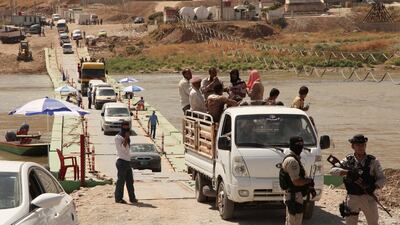Iraqi troops deployed on Tuesday at one of the main land crossings with Turkey, gaining a foothold on the Kurdish-held frontier for the first time in decades and imposing one of Baghdad's central demands on the Kurds.
Iraq's entire land border with Turkey is located inside the Kurdish autonomous region, and has been controlled by the Kurds since before the fall of Saddam Hussein in 2003.
But since the Kurds staged a referendum on independence last month that Baghdad considers illegal, the central government has demanded a presence at all border crossing points.
The Iraqis set up positions between the Turkish and the Iraqi Kurdish checkpoints at the Habur border crossing between the Turkish town of Silopi and the Iraqi town of Zakho, a security source in Baghdad said.
Vehicles crossing the border would now be subject to three checks - by Turks, Iraqi forces and the Kurds.
"Habur border gate has been handed over to the central [Iraqi] government as of this morning," Turkish prime minister Binali Yildirim told members of his ruling AK Party in parliament in Ankara.
Despite this, officials from the Kurdistan Regional Government (KRG) said they had not relinquished control of the crossing. Discussions were ongoing to allow Iraqi "oversight" at the border, said Hoshyar Zebari, a former Iraqi foreign minister now working as an adviser to the KRG.
An Iraqi official showed pictures of the Iraqi flag being raised at the border gate, where Iraqi and Turkish soldiers were deployed and Turkish flags also hoisted.
Control of the border is of crucial importance for the landlocked autonomous Kurdish region. An oil pipeline runs from northern Iraq into Turkey, carrying crude exports which are the principal source of funds for the Kurds.
The balance of power between Iraqi central government forces and the Kurdish region has been transformed since the Kurds staged their referendum on September 25.
_______________
Read more:
Kurdish opponents of Barzani report attacks on offices
Analysis: Barzani remains the power in a greatly weakened Kurdistan
_______________
Iraqi prime minister Haidar Al Abadi ordered his forces to recapture all territory held by the Kurds outside the borders of their autonomous region, and most of it was seized earlier this month within a matter of days.
Baghdad is also demanding control of all border crossings with Turkey and Iran. Mr Al Abadi has won backing from both Tehran and Ankara for his moves against the Kurds.
Iraq's military said a delegation headed by army chief of staff Lieutenant General Othman Al Ghanmi was visiting the area to take control of Kurdish-held international border checkpoints with both Turkey and Syria.
Mr Zebari, the Kurdish government adviser, said the Kurds were prepared to accept "Iraqis at the airports and border posts to have oversight, to make sure everyone is in compliance", but any such presence must be achieved through negotiations, not force.
The split between the Kurds and the Iraqi central government is a particular challenge for Washington, which is closely allied to both sides. The United States had urged the Kurds not to hold the referendum over concerns it would precipitate a backlash and distract from the battle against ISIL.
The referendum and ensuing dispute with Baghdad has also exposed deep rifts within the Kurdish leadership. Kurdish president Masoud Barzani announced on Sunday he would step down, and accused security forces loyal to a rival political party of "high treason" for yielding territory to the central government without a fight.
The KRG and the central Iraqi government held talks from Friday until Sunday to resolve their conflict.
Turkish prime minister Yildirim said Ankara had agreed to open another border gate with Iraq as part of a route that would lead to the city of Tal Afar, some 40 kilometres west of Mosul and home to a predominantly ethnic Turkmen population.
It came after Iran's chief of staff, Major General Mohammad Baqeri, said on Monday Tehran would reopen all its border crossings with Iraq's Kurdish region in the coming days, lifting restrictions imposed after last month’s referendum.
He renewed his warnings against Kurdish secession plans, saying "there would be bloodshed in Iraq, and neighbouring countries would be affected".

